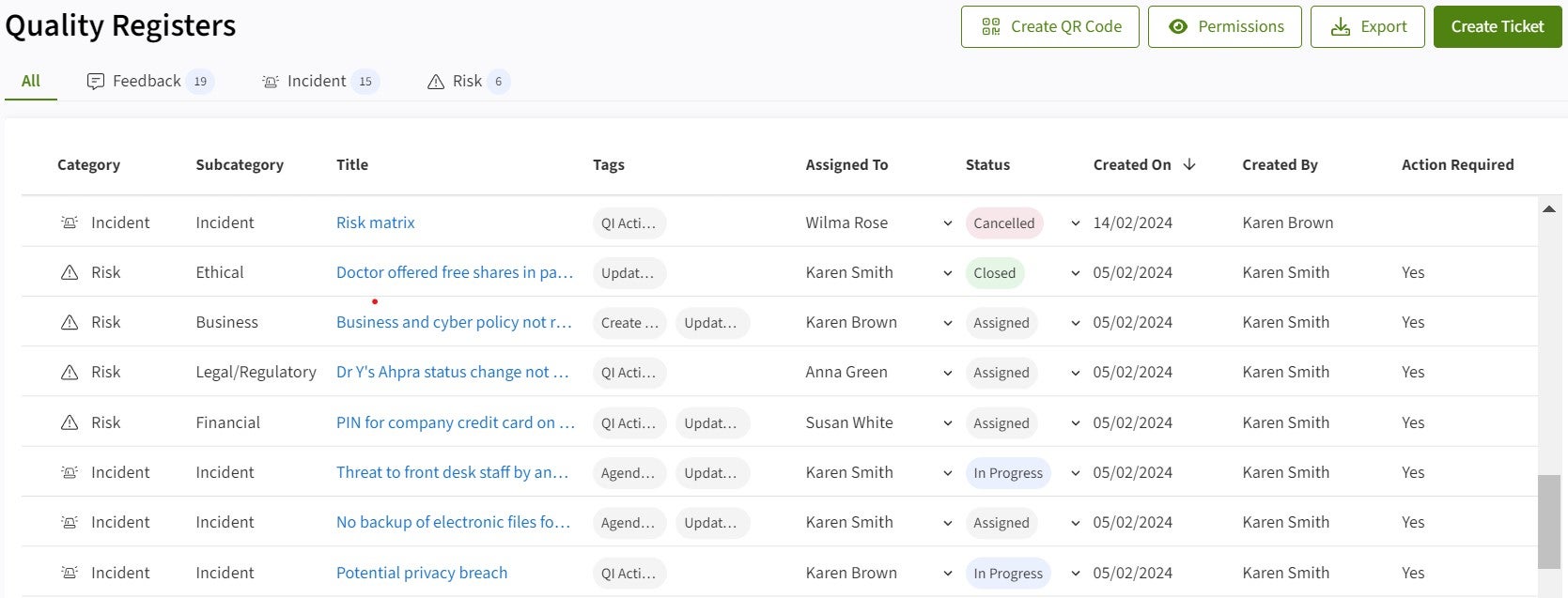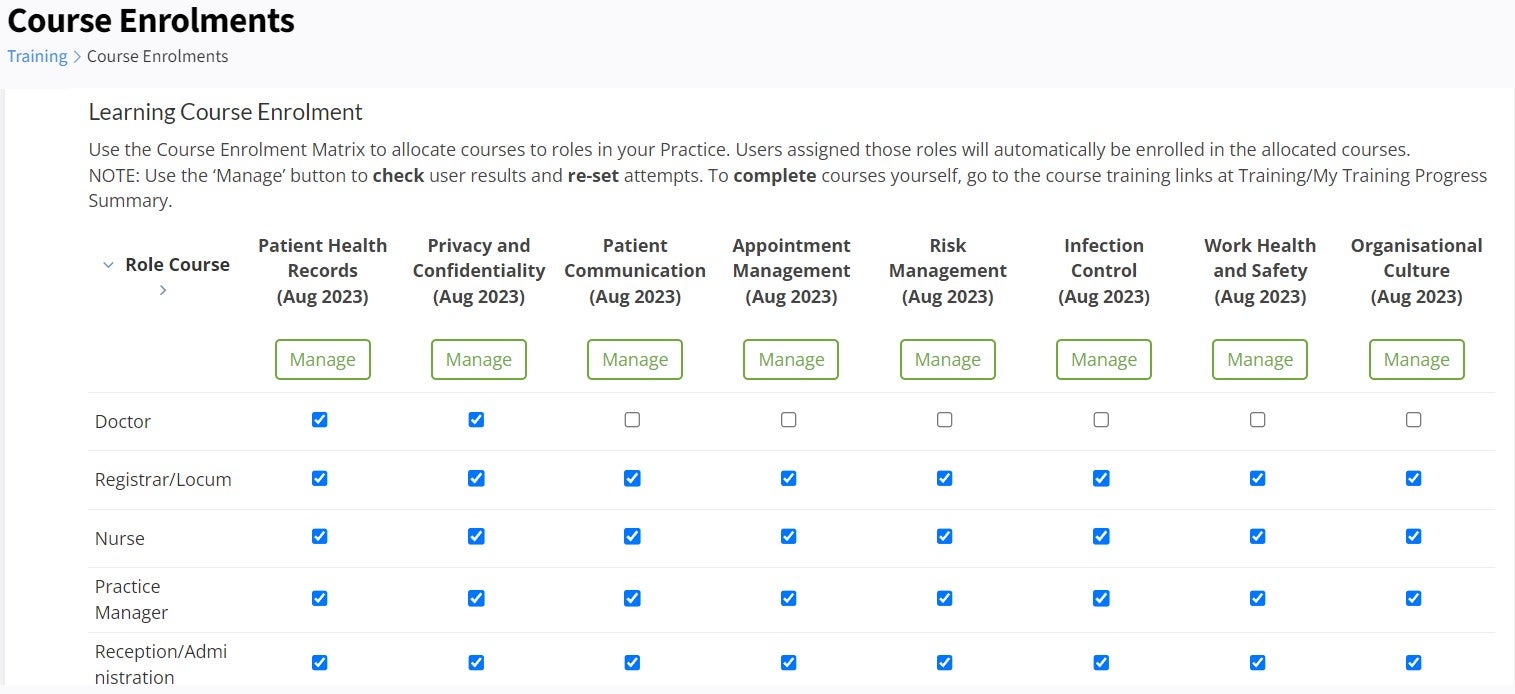
4 things your practice must do to ensure healthcare governance compliance
As a practice manager of a GP, specialist or dental clinic, ensuring healthcare governance can often feel overwhelming.
From creating policies and procedures to managing risks and incidents, the responsibilities can quickly pile up. If you find yourself spending too much time on these processes, this guide is for you.
Read on to learn:
- The 4 key healthcare governance requirements set by bodies like the RACGP.
- Tips for saving time and efficiently managing policies, risks, incidents and patient feedback.
- Strategies to better protect your practice from HR risks.
1. Managing incidents and risks for healthcare governance
Establishing strong risk management processes is a key healthcare governance requirement of the RACGP Standards for general practices.
This can include creating registers to track risks and incidents, adding risk management as an agenda item to your regular meetings and documenting actions taken in response to incidents.
However, managing these processes can be overwhelming, especially if you’re relying on multiple spreadsheets and manual task assignment via email.
One way to help avoid these manual processes is with PracticeHub’s Quality Registers. It allows you to:
- Easily create tickets for incidents, risks and patient feedback in a centralised system.
- Assign responsibility to a staff member and update status once the issue is resolved.
- Update, edit or close tickets as required, with changes automatically tracked.

2. Handling patient complaints
Having a process for handling patient complaints and suggestions is important for any kind of healthcare practice. It’s a healthcare governance requirement of the RACGP Standards and one PracticeHub can help with.
A very useful feature of Quality Registers is the ability record complaints using a QR code. For instance, you can set up a QR code in your waiting room, allowing patients to submit feedback via their smartphones.
Once a complaint is logged, you’ll receive an alert, enabling you to quickly assign a staff member to handle the complaint.
This can potentially save you a lot of time that would have been spent manually entering data from paper forms and sending many emails.
3. Staff training
Ongoing staff training is crucial for maintaining healthcare governance with clinical guidelines, safety protocols and legal requirements. It also helps minimise HR risks.
For example, ensuring all staff complete work health and safety training could help protect your practice from liability in the event of a health and safety incident.
PracticeHub, for instance, includes a work health and safety training module that a new recruit can complete. If they are involved in a safety incident, you can easily retrieve evidence that they received work health and safety training in PracticeHub.
The platform includes a range of training modules on topics like infection prevention, privacy and confidentiality, and risk management, which you can assign to practitioners and staff as shown below.

4. Policies and procedures to ensure healthcare governance
Policies and procedures guide daily operations and ensure consistency in service delivery. Like training, they’re also critical for reducing HR risks.
Let’s consider a scenario where a staff member is dismissed for bullying and later contests the decision at the Fair Work Commission. Showing proof that you provided them with bullying and harassment training could help protect your practice from liability.
Policies and procedures are, however, very time-consuming to write. You also need to ensure they’re signed off by your team.
PracticeHub offers over 100 customisable, ready-made policies and procedures covering everything from work health and safety to your practice’s dress code.
You can quickly assign them to all or select staff, who will receive automatic reminders to sign off. And you can track all sign offs in PracticeHub’s dashboard. This can save you significant time sending emails and chasing up staff.
Want to build a high-performing, well-managed specialist practice?
Download our free guide for specialist practices and learn the key elements for long-term success. You’ll discover:
- What to include in your business plan and your key responsibilities as an employer
- Why systems, policies and procedures are critical for growth
- How clear staff roles and smooth onboarding boost performance
- How our digital platform, PracticeHub, can help simplify daily operations.
The information on this webpage does not constitute legal, financial or other professional advice and should not be relied upon as such. It is intended only to provide a summary and general overview on matters of interest and it is not intended to be comprehensive. Persons implementing any recommendations contained on this webpage must exercise their own independent skill or judgment and seek appropriate professional advice relevant to their own particular circumstances. Compliance with any recommendations will not in any way guarantee discharge of the duty of care owed to patients and others coming into contact with the health professional or practice. Avant Practice Solutions and its related entities are not responsible to any person for any loss suffered in connection with the use of this information. Information is only current at the date initially published. © Avant Mutual Group Limited 2026.
